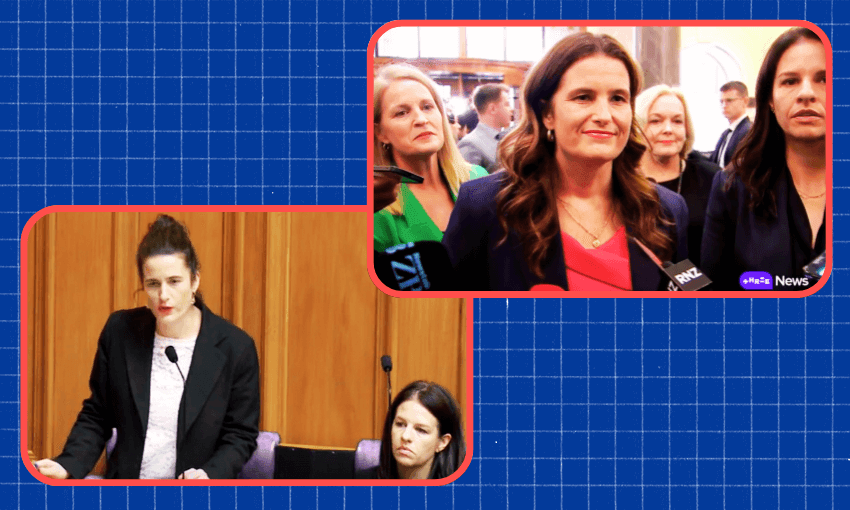The far-reaching changes to New Zealand’s pay equity framework pushed through under urgency this week are about ‘improving the process’, we’ve been told. But what, exactly, is the problem that needs to be fixed?
This week the government pushed through changes to the Equal Pay Act 1972 under urgency, only announcing the forthcoming changes within hours of them being debated in parliament. The ramifications of this change are significant: it wipes out current claims no matter how far they have progressed. As coalition government ministers mentioned over various media and parliamentary debate, this is not about pay equity – it is about improving the process. So, what exactly is the problem, and did it need fixing?
Affordability and red tape
National has always been clear that while they support working women, they cannot, in fact, afford to pay them fairly. This is not new and is behind the government intervening in the court process begun by Kristine Bartlett – minimising the cost involved in a settlement was a key priority when a true, gender-equitable evaluation of care and support work could be too expensive. In fact, that really is the pivotal point as the prime minister, Act and other coalition MPs clearly stated. Whether that’s in part due to budget requirements is up to interpretation, but paying women fairly for their work, expertise, experience, qualifications and contribution to the economy is just not good business.
Act, meanwhile, is on a red tape warpath. They assert themselves as free-market lovers, wanting everyone to have the choice to negotiate lives without government interference. But this is not the reality of Act’s agenda. While neoliberalism gets thrown around, well, liberally, today it has evolved from the Juggernaut unleashed on us in the 80s to a new, more subtle form that focuses on freeing up things for businesses, and regulating the lives of, let’s face it, those worse off – like women.
The new changes to the Equal Pay Act 1972 actually create “red tape” for women – raising the “bar” to commence a claim, adding in additional (unpaid – how womanly) workload of researching discrimination in their wages before their claim can even be considered. Not to mention the colossal lost productivity of extinguishing 33 current claims, some of which have been carefully, step by step, evidencing their claim for several years. In fact, in terms of red tape, it was government agency Te Whatu Ora that stomped all over the current care and support workers’ claim at the last minute – after employers, unions and a multi-agency “overview working group” had agreed the details, including comparator, Te Whatu Ora unexpectedly disputed the claim, oddly enough when it was finally costed out.
Emotion, merit and the woke wars
Ironically, the way in which these changes were argued reinforced our ideas of femininity and women as somehow lesser. The current claims, made by women of course, were talked about as not being “robust”, as lacking evidence. In other words, women’s knowledge, women’s expertise cannot be trusted, might somehow be “emotional”, as coalition MPs kept mentioning in the bill’s debate. The issue of pay equity was being blurred by “a whole lot of emotive language about all of these things and how we’re selling women down the road, and all of this emotional language which will make it easy to get some points”, said NZ First MP Casey Costello in the House on Tuesday, for example.
Front and centre to these changes is the idea of “merit”. We’ve already heard all about “merit” in the woke wars, with New Zealand First’s claims that “DEI” initiatives undermine the “meritocracy” on which New Zealand is founded. On the surface, you could wonder if there perhaps is a lack of appreciation of merit when many occupations and professions that are dominated by women seem to get paid less than male-dominated professions. Merit is something that is often defined, and assessed, by those in power. And, the changes to the Equal Pay Act do that – the merit of a claim of gender discrimination will now more clearly sit with the employer. While the war on woke is a key NZ First battle cry, the linking to merit and ideas of expertise are clearly in Act’s ballpark. As was evidenced by Act’s Treaty principles bill, they do not want professionals and experts, such as judges, to have say in much. Expertise is woke – and the cabinet paper and press release published when the pay equity overhaul was announced this week reflects that, with either blatant ignorance of pay equity, gender discrimination and job evaluation or a lack of regard for it.
Emerging from MP Casey Costello’s “‘muddy waters” of the (now) previous legislation, what problem emerges? The problem is clearly ideological, and in that sense this is a brilliantly timed and designed law change because it neatly combines the ideological strongholds of each of National (fiscally responsible, small government), Act (cut red tape and experts) and New Zealand First (war on woke) into one nasty piece of legislation that reduces the wages of women, attacks the public sector workforces that we actually need, puts women back in their “emotional” place, and literally reduces their ability to do anything about it.






